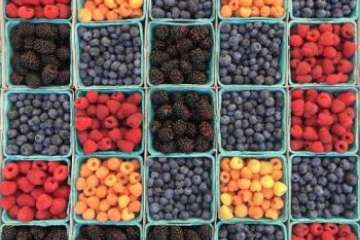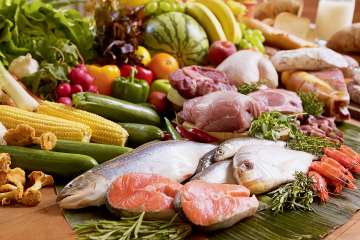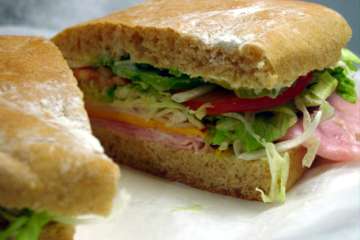Basic Nutrition
Find your care
You receive customized, exceptional diabetes treatment and education in a caring environment. Call 310-825-7922 to connect with a diabetes specialist.
Introduction to Nutrition for Patients with Diabetes
A healthy “diet” includes a daily intake of fresh vegetables and whole grains. Add more color to your meals! Watch your portion sizes – know what a serving size is. Learn how to read a food label. Decrease your intake of processed foods & saturated fats. Drink more water.
Carbohydrate

- Carbohydrates are important! They’re used by our cells for fuel. Your brain needs a minimum of 120 grams per day for energy
- Yet they’re also the main nutrient that raises blood glucose
- Carbohydrates are glucose & starches (see below for examples)
- Fiber is a carbohydrate but does not raise blood glucose. Fiber is good for the heart & for digestion. It also slows the absorption of glucose into the bloodstream
- Look at the food label or a carbohydrate counting guide (www.calorieking.com) and follow the recommendations of your diabetes team.
Simple Carbohydrates = Sugars / Sweets
- Absorbed very quickly – leading to spikes in blood glucose
- Eat these foods in very limited amounts OR choose sugar-free/diet alternatives (Sugar (white or brown), honey, maple syrup, molasses, candy, jams & jellies, icing, regular soda, juice, condensed milk, fruit pies and FRUIT)
Fruit

- Avoid fruit in the morning. Instead eat fruit later in the day, at the end of a meal. Do not eat fruit alone or as a snack.
- Avoid tropical fruits (bananas, pineapples, mangoes, papaya, melons, kiwis, watermelon, dates) and avoid dried fruits (raisins).
- Instead choose blueberries, strawberries, raspberries, blackberries, apples, pears, and plums.
Complex Carbohydrates = Starches / Grains / Starchy Vegetables
- Choose whole grains & foods high in fiber – this will slow down the absorption of the glucose into your blood stream (whole wheat pasta, brown rice, whole grain bread as opposed to regular pasta, white rice or white bread).
The following are considered one serving of carbohydrate or approximately 15 grams:
- Grains: ¾ cup cereal (Cheerios), ½ cup cooked cereal (oatmeal), 1 slice whole wheat bread, 3 (6 inch) corn tortillas, 1 (burrito size) whole wheat flour tortilla, ½ whole wheat roll, ½ cup cooked whole wheat pasta, 1/3 cup brown rice, ¼ whole wheat bagel
- Starchy Vegetables: ½ cup potatoes/yams/sweet potatoes, 1/3 cup beans (pinto, black), ½ cup peas, ½ cup corn, ½ cup lentils
- Dairy: 1 cup low-fat milk, 1 cup soy or rice milk, 1 cup plain yogurt, ¼ cup ice-cream, ¼ cup fat free frozen yogurt, ½ cup sugar free pudding
Protein & Fat

- Protein & fat do NOT raise blood glucose
- If you are trying to lose weight, reduce your intake of fats, because fats are high in calories
- For a healthy heart, reduce your intake of saturated fats and cholesterol
- Choose lean cuts of meat and low fat options
Proteins: 4-5 oz meat (chicken breast, turkey breast, lean cuts of beef, fish, pork, lamb), low-fat cheese, egg whites, tofu
Fats: 1 Tbsp oil (olive, canola), avocados, 1 oz olives, 1 oz nuts, 1 Tbsp natural nut butters (almond), 1 Tbsp low-fat cream cheese, 1 Tbsp salad dressing (ranch, blue cheese), 1 Tbsp mayonnaise
Free Foods
- These will NOT raise your blood glucose
- Eat at least 3 cups per day of fresh or frozen non-starchy vegetables
- Salad greens, non-starchy vegetables (carrots, broccoli, green beans, onions, peppers, tomatoes, zucchini, artichokes, asparagus, cauliflower, cucumber, eggplant, mushrooms)
- Beverages – water, tea (unsweetened), diet soda, diet juice (Ocean Spray, Snapple)
- Sugar free jello, sugar free popsicles
- Sweeteners – Splenda, Equal, Sweet & Low, Stevia
- Condiments (mustard), vinegar, spices
Sample Meal Plan

- Meal: Breakfast
- Carbs (g): 30
- Servings: two
- Example: 1 cup oatmeal (or 2 slices toast), scrambled eggs, turkey bacon
- Meal: Lunch
- Carbs (g): 45
- Servings: three
- Example: Sandwich w/ two slices whole wheat bread w/ low fat turkey, lettuce, etc, small salad w/ dressing, 1 cup yogurt
- Meal: Dinner
- Carbs (g): 45
- Servings: three
- Example: 5 oz grilled chicken breast, 1 baked sweet potato, steamed non-starchy vegetables, ½ cup berries (raspberries/blueberries/strawberries)
What about Snacks?
- Choose protein for snacks. Some good choices: mozzarella string-cheese, turkey deli-meat, celery & natural nut butter (almond), carrots & hummus, handful of nuts, edamame, hard-boiled eggs, cottage cheese
Visit the American Diabetes Assocation for more eating plan tools.
Cómo leer las etiquetas de los alimentos PDF
Food List for Carbohydrate Counting PDF
Lista de alimentos para el conteo de carbohidratos PDF
Ejemplos de planes de comidas PDF
Low Carbohydrate Snack Ideas PDF
Meriendas bajas en carbohidratos PDF